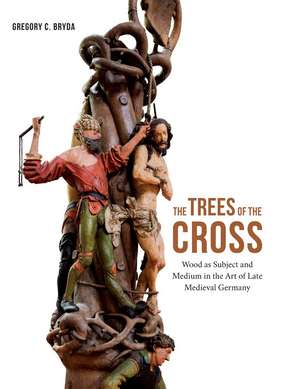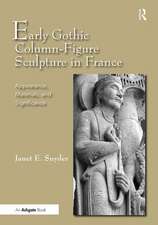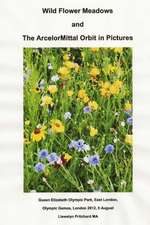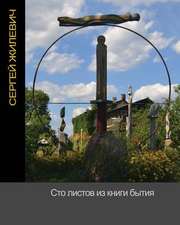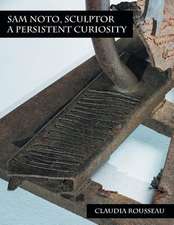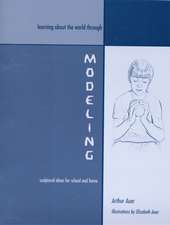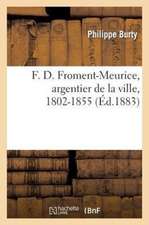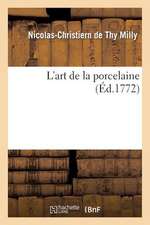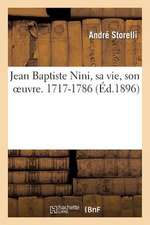The Trees of the Cross: Wood as Subject and Medium in the Art of Late Medieval Germany
Autor Gregory C. Brydaen Limba Engleză Hardback – 27 iun 2023
“A rewarding study that is full of new insights.”—Jeremy Warren, Art Newspaper
In late medieval Germany, wood was a material laden with significance. It was an important part of the local environment and economy, as well as an object of religious devotion in and of itself. Gregory C. Bryda examines the multiple meanings of wood and greenery within religious art—as a material, as a feature of agrarian life, and as a symbol of the cross, whose wood has resonances with other iconographies in the liturgy. Bryda discusses how influential artists such as Matthias Grünewald, known for the Isenheim Altarpiece, and the renowned sculptor Tilman Riemenschneider exploited wood’s multivalent nature to connect spiritual themes to the lived environment outside church walls. Exploring the complex visual and material culture of the period, this lavishly illustrated volume features works ranging from monumental altarpieces to portable pictures and offers a fresh understanding of how wood in art functioned to unlock the mysteries of faith and the natural world in both liturgy and everyday life.
Preț: 432.26 lei
Preț vechi: 469.85 lei
-8% Nou
Puncte Express: 648
Preț estimativ în valută:
82.71€ • 86.37$ • 68.30£
82.71€ • 86.37$ • 68.30£
Carte disponibilă
Livrare economică 25 martie-08 aprilie
Livrare express 11-15 martie pentru 56.53 lei
Preluare comenzi: 021 569.72.76
Specificații
ISBN-13: 9780300267655
ISBN-10: 0300267657
Pagini: 224
Ilustrații: 124 color + 34 b-w illus.
Dimensiuni: 216 x 279 x 21 mm
Greutate: 1.18 kg
Editura: Yale University Press
Colecția Yale University Press
ISBN-10: 0300267657
Pagini: 224
Ilustrații: 124 color + 34 b-w illus.
Dimensiuni: 216 x 279 x 21 mm
Greutate: 1.18 kg
Editura: Yale University Press
Colecția Yale University Press
Recenzii
“In late medieval Germany, religious art was full of trees, vines, and other plants, symbolizing the strong ties between agrarian and spiritual life. Art historian Gregory C. Bryda surveys these botanically influenced masterpieces in his new book The Trees of the Cross, including works by some of the era’s great masters.”—Peter Saenger, Wall Street Journal
“A rewarding study that is full of new insights.”—Jeremy Warren, Art Newspaper
“Novel, convincing, original, and potent . . . a worthy (even essential) companion to Michael Baxandall’s Limewood Sculptors of Renaissance Germany.”—John Hagood, ARLIS/NA Reviews
“Demonstrates a depth of historical scholarship, artistic interpretation, and nuanced listening. . . . A beautiful book.”—Zachariah Motts, Reading Religion
2024 PROSE Award finalist, Art History and Criticism category, sponsored by the Association of American Publishers
“Going deeper into history and daily life than scholarship on materiality and ecology ordinarily ventures, Bryda’s argument persuasively demonstrates that late medieval German art is invested with a rhythm of seasons, harvest, and bloom. Elegantly written and packed with new discoveries, this is a book to be imbibed, ingested, and oft consulted.”—Shira Brisman, University of Pennsylvania
“The Trees of the Cross is a truly interdisciplinary study that will resonate beyond art history in the fields of ecology, ethnography, folklore studies, and both economic and agrarian history. Engagingly written, the book provides an important corrective to our broader understanding of the role of nature in late medieval German art.”—Achim Timmermann, University of Michigan
“A rewarding study that is full of new insights.”—Jeremy Warren, Art Newspaper
“Novel, convincing, original, and potent . . . a worthy (even essential) companion to Michael Baxandall’s Limewood Sculptors of Renaissance Germany.”—John Hagood, ARLIS/NA Reviews
“Demonstrates a depth of historical scholarship, artistic interpretation, and nuanced listening. . . . A beautiful book.”—Zachariah Motts, Reading Religion
2024 PROSE Award finalist, Art History and Criticism category, sponsored by the Association of American Publishers
“Going deeper into history and daily life than scholarship on materiality and ecology ordinarily ventures, Bryda’s argument persuasively demonstrates that late medieval German art is invested with a rhythm of seasons, harvest, and bloom. Elegantly written and packed with new discoveries, this is a book to be imbibed, ingested, and oft consulted.”—Shira Brisman, University of Pennsylvania
“The Trees of the Cross is a truly interdisciplinary study that will resonate beyond art history in the fields of ecology, ethnography, folklore studies, and both economic and agrarian history. Engagingly written, the book provides an important corrective to our broader understanding of the role of nature in late medieval German art.”—Achim Timmermann, University of Michigan
Notă biografică
Gregory C. Bryda is assistant professor of art history at Barnard College, Columbia University.
Descriere
A revelatory study exploring wood’s many material, ecological, and symbolic meanings in the religious art of medieval Germany
